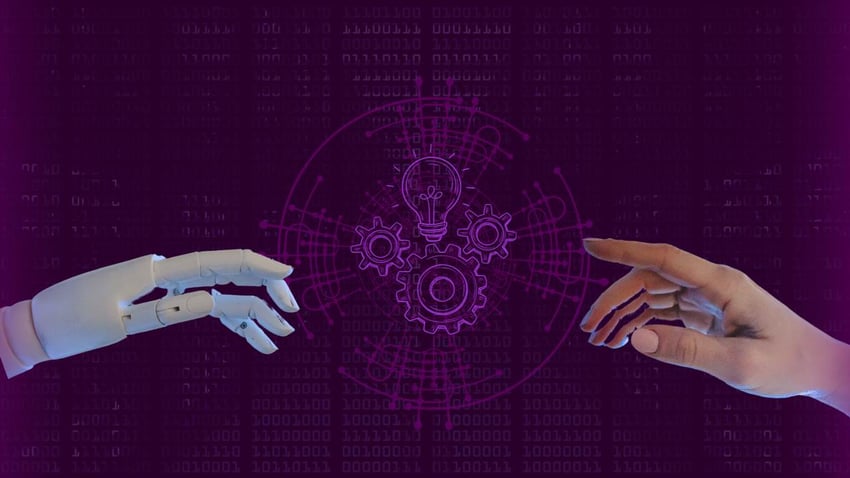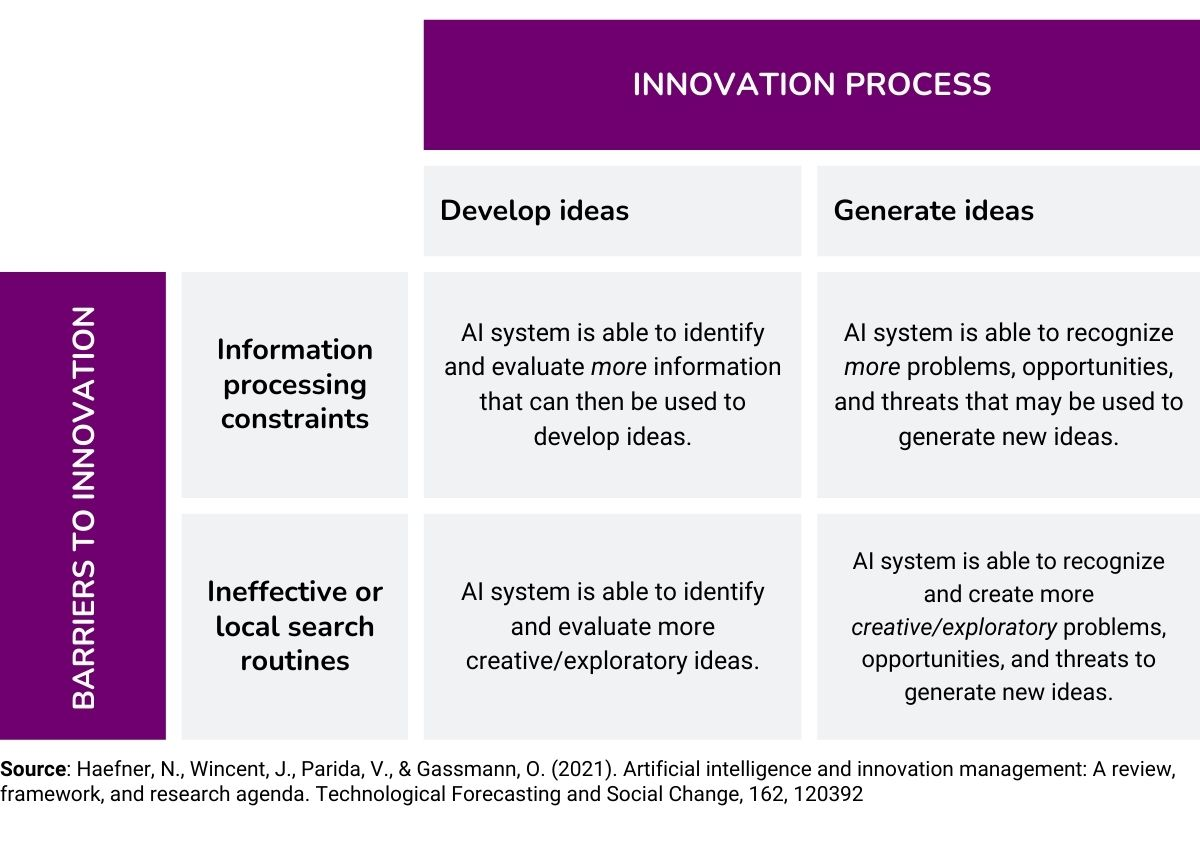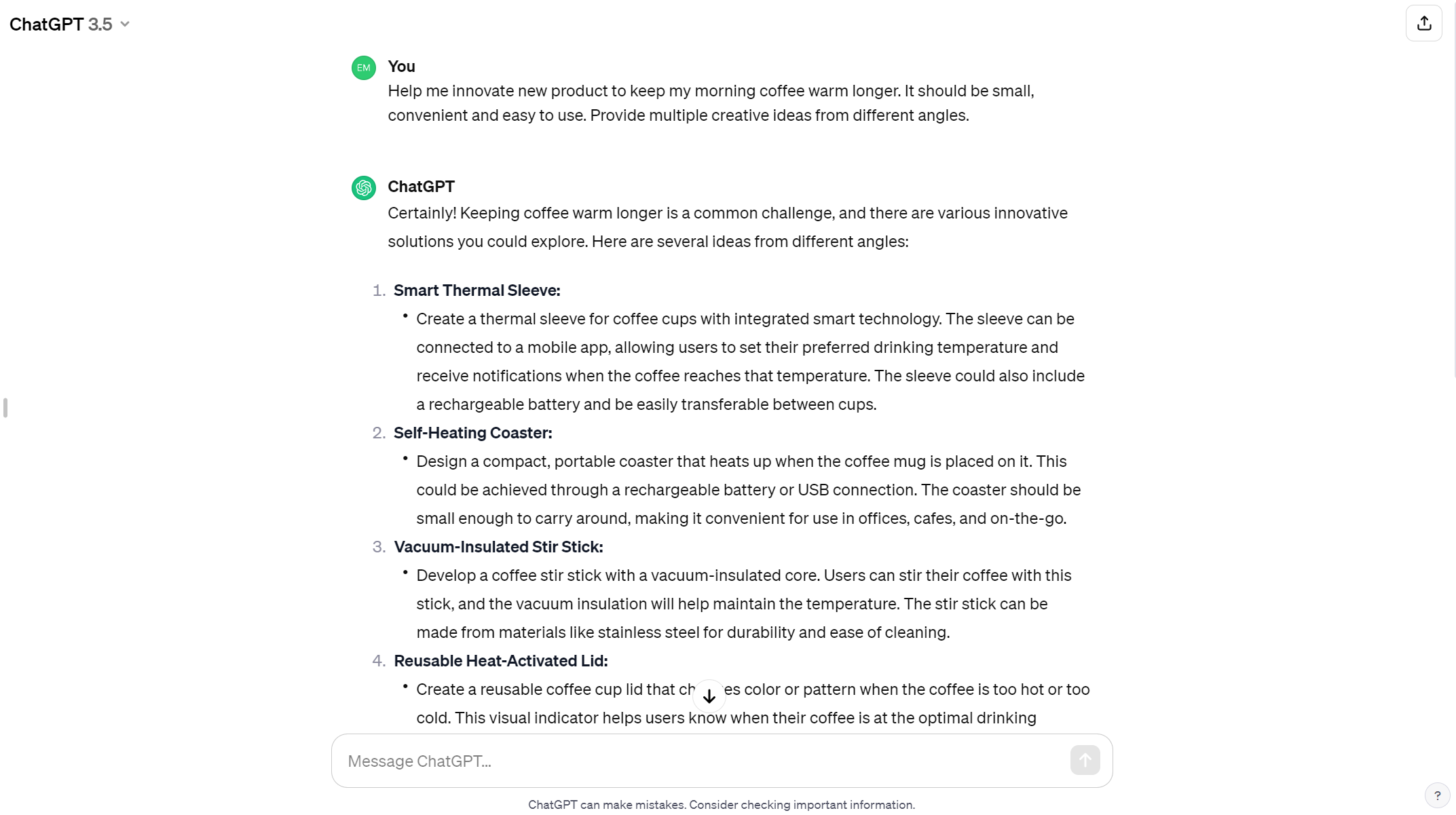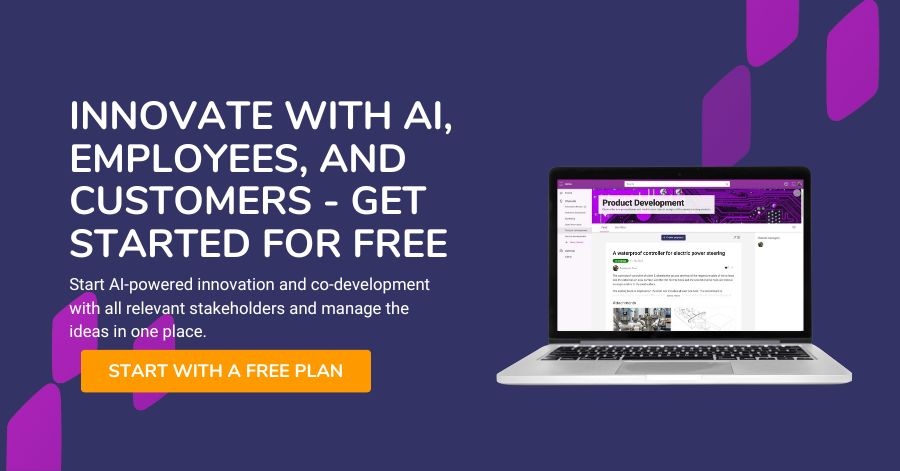According to a recent survey, artificial intelligence (AI) has rapidly transformed the world around us, with 71% of organizations already using AI. Also, AI use cases have been expanding, and it is now used for automating processes, developing new products and services, and, all in all, gaining a competitive edge across industries.
This also applies to the field of innovation. Companies integrating AI into their processes can gain a substantial advantage over their competitors. That's why AI-driven innovation is something organizations should take a close look into.
What is AI-driven innovation?
Let's start with the basics. AI-driven innovation means the application of artificial intelligence (AI) technologies to the innovation process. It involves leveraging AI algorithms, natural language processing, and other AI techniques to generate new ideas, develop them further, and improve decision-making.
We define innovation as implementing new ideas that result in positive change. AI technologies can help drive innovation, as they can be utilized in several ways to develop new products, services, and processes and enhance existing ones. While AI definitely has the potential to lead to positive change and innovation, it can't do it by itself.
AI-driven innovation is not about replacing human creativity but rather empowering it. A study on AI in innovation management stated that AI's idea-generation capabilities are valuable but incapable of completely replacing human managerial judgment any time soon.
Combining the power of AI with human expertise has the potential to revolutionize the way we create new solutions and approach innovation. That's why learning how to use AI in innovation is important.

Can AI create new inventions?
A question that is often asked is - can AI innovate? Or does it present only pre-existing ideas? Generative AI tools are taught with enormous amounts of data. It means it has vast knowledge but can't create something new outside its knowledge base. So, the ideas are always based on its training data.
But, in fact, many of the greatest innovations stem from rearranging pre-existing ideas and concepts. AI excels at combining, refining, and altering pre-existing ideas, as well as restructuring data. So, it is fair to say AI has the potential to drive true innovation and serve as a valuable support in idea generation. Its value should be further explored and examined.
How can AI be used in innovation?
AI drives innovation through its diverse capabilities, particularly in analyzing data to make predictions, generate creative ideas, and offer suggestions for improvement.
AI capabilities can be harnessed at various stages of the innovation process, including idea generation and development, concept prioritization, and evaluation. It can potentially elevate creativity and generate innovative ideas while providing valuable perspectives to human ideas.
According to a study by Haefner et al. 2021, AI poses a great benefit in tackling the barriers to innovation. It also enhances the process of both developing and generating ideas. How it benefits innovation is illustrated in the table below.

Additionally, there are several other areas where AI can contribute to driving innovation. Here are to mention a few:
- Idea Generation: One of the greatest AI use cases in innovation, in my opinion, is its ability to generate infinite ideas. It amplifies divergent thinking, allowing us to explore ideas from various perspectives and easily curate the most promising ones. Read more about AI in idea generation here.
- Creativity: Generative AI enhances creativity by rapidly producing diverse ideas. According to research conducted by BCG, using ChatGPT AI outperformed human teams by 40% in product innovation.
- Idea refining: AI is great at refining ideas. It can combine and develop ideas, give suggestions and pros and cons, or offer different perspectives. And, of course, you can use it for both refining further human ideas or, alternatively, the best ones it created.
- Problem-Solving: AI can simulate complex problems and evaluate potential solutions, providing valuable insights and guiding decision-making. Furthermore, AI can quickly process and analyze data from multiple sources, allowing it to consider various factors and variables when considering potential solutions.
- Reveal market trends: AI can analyze vast amounts of data to identify patterns and trends. According to BCG, revealing trends and competitor activities are some of the most common use cases for AI in innovation.
Incorporating AI in innovation can be a valuable tool for companies to foster divergent thinking and assist in evaluating and refining ideas. However, it is essential to remember that the final decision-making should still involve assessing the ideas yourself and not solely relying on the outputs of AI. This step is critical to maintain control and avoid overly relying on AI-generated suggestions.
Benefits of AI-Driven Innovation
As mentioned earlier, there are numerous benefits to embracing AI for innovation. By incorporating AI into the innovation process, organizations can unlock many advantages. Some of these include:
- Increased efficiency and productivity: AI can streamline processes, reduce errors, and automate repetitive tasks, improving efficiency. AI has been shown to speed up idea generation.
According to a study, professionals utilizing ChatGPT-4 generate ideas at a pace of 800 per hour. In contrast, working without AI support generates only 20 ideas per hour. This highlights the potential of leveraging AI in innovation to be around 40 times more productive in idea generation than human-only teams. - Boosted Market Competitiveness: Since AI-powered innovations are often more creative and quicker to generate, they can lead to better solutions. It can give organizations a competitive edge, leading to market growth and increased revenue.
- Cost-savings: AI-driven innovation also has the potential to drive cost savings. Organizations can reduce costs, minimize waste, and optimize resource allocation by automating tasks and optimizing processes.
- Access to a wide range of data: Unprecedented data analysis and analytics AI-driven innovation helps organizations process large volumes of data quickly and efficiently. The ability to analyze data helps companies identify trends and make data-driven decisions more efficiently than ever before.
AI is a powerful transformative force that has the potential to revolutionize innovation across industries. By embracing AI, businesses can create more personalized, efficient, and effective products, services, processes, and experiences. Furthermore, AI-driven innovation can lead to new creative products and services. By leveraging AI technologies, organizations can uncover hidden insights, identify emerging trends, and create innovative solutions that address unmet needs.
Navigating the challenges of AI-Driven Innovation
While AI-driven innovation holds immense potential, it also poses some challenges that must be addressed. These challenges primarily revolve around data privacy and intellectual property rights (IPR).
Data privacy is a critical concern when it comes to AI-driven innovation. Data privacy issues can arise in AI-powered innovation when personal and company data is used to train the AI models. However, solutions that prioritize data privacy are available, such as Orchidea. In Orchidea, your data is not used to train the AI, and it cannot be linked to your company, ensuring that data privacy is sustained.
Another challenge is the risk associated with IPR (intellectual property rights) when innovating with AI. AI tools, like ChatGPT, generate many ideas but do not check for patents and trademarks. Organizations need to assess the generated ideas and ensure they are allowed to use them without intruding on any patents or trademarks.
Furthermore, it is important to note that mastering AI-driven innovation may require a learning curve. Take the necessary time to explore and discover the most effective prompts, provide enough details, and experiment with various approaches. This willingness to explore will ultimately lead to harnessing the full potential of AI in driving innovation.
While some challenges exist, the opportunities for AI-driven innovation are immense. To succeed in this changing landscape, businesses must adopt best AI practices and evaluate AI outputs with human effort.
AI tools for innovation
As AI has become more and more important in our daily lives, several AI tools have emerged to help harness the power of AI in their innovation processes. Here are a few examples:
ChatGPT:
ChatGPT, developed by OpenAI, is a powerful language model that can be used to brainstorm new ideas, write creative content, and generate proposals. With ChatGPT, individuals can generate new ideas and explore opportunities. This AI tool is handy for individuals looking for inspiration or seeking to overcome creative blocks.
One downside of innovating with ChatGPT is its data security. It uses your data and inputs to train the AI, and it can link the data to your account. When ideating with ChatGPT, you can ask for ideas, their pros and cons, development ideas, or other enhancements. We have gathered some useful prompts to use in brainstorming with AI in our blog post.

Orchidea:
There are also more specific AI tools designed for innovation. Orchidea is a great AI-powered innovation platform where you can harness AI in various ways. It helps you generate and develop new ideas collaboratively. It uses AI in various cases, from idea generation to refining concepts. Orchidea continuously develops its AI features, from idea generation in brainstorming to innovation challenges and idea management.
With Orchidea Workshop, you can start an AI-powered brainstorming session, where the AI acts as a participant and creates ideas among your team. It also assists in idea development and creates solution proposal drafts to further develop ideas.
With Orchidea, you can organize AI-assisted workshops easily and securely. Orchidea tackles the data privacy issues ChatGPT has so the inputs are not used to train the AI and cannot be linked to the user or a company. Data retention is also limited to 30 days. Starting an AI workshop with Orchidea takes only seconds: just fill in your workshop details, invite participants with an easy link, and get started.
You can start using Orchidea for free here!
To sum up: The future of AI-Driven Innovation
AI-powered innovation is revolutionizing the innovation landscape, unlocking growth opportunities. As AI technology continues to evolve, we can anticipate an integration of AI across industries, empowering AI systems to become even more intelligent.
By integrating AI into their innovation processes, companies can benefit from increased efficiency, boosted market competitiveness, cost savings, and access to a wide range of data. However, it is crucial to be mindful of the limitations and ethical considerations.
By harnessing the power of AI, organizations can create innovations faster, enhance their competitive edge, and build solutions that would not have emerged otherwise.
Can AI completely replace the human aspect of innovation management? While AI can generate cost-effective and creative ideas, human expert judgment remains challenging to replicate. Therefore, organizations must embrace AI as a valuable tool that empowers human creativity and decision-making. By adopting best AI practices and evaluating AI outputs with human effort, businesses can harness the full potential of AI in driving innovation.
.jpg)

.png)

